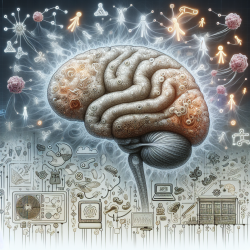Recent research has shed light on the significant impact of play-based interventions on the mental health of children with Autism Spectrum Disorder (ASD) and Developmental Language Disorder (DLD). The systematic review and meta-analysis titled "Play-based interventions for mental health: A systematic review and meta-analysis focused on children and adolescents with autism spectrum disorder and developmental language disorder" provides compelling evidence for practitioners to enhance their skills and encourage further research in this area.
Key Findings from the Research
The review identified 10 studies that met the criteria for inclusion, all focused on children with ASD. The meta-analysis revealed that play-based interventions have a significant positive effect on positive mental health outcomes (Cohen's d = 1.60, p = 0.01). However, the effect on negative mental health outcomes was not significant (Cohen's d = 0.04, p = 0.88).
Positive Mental Health Outcomes
Five studies were grouped under positive mental health outcomes, using interventions such as DIR/Floortime, the PLAY Project, Focused Playtime Intervention, and Pretend Play Intervention. These interventions were found to significantly improve emotional development, attachment, and positive affect in children with ASD.
- DIR/Floortime: Focuses on emotional development and has shown significant improvements in shared attention, social communication, and emotional functioning.
- PLAY Project: A home consultation program that enhances social reciprocity and reduces autism symptomatology through play-based interactions.
- Focused Playtime Intervention: A naturalistic intervention that improves social communication and attachment behaviors.
- Pretend Play Intervention: Enhances imaginative skills, emotional expression, and social communication.
Negative Mental Health Outcomes
Six studies focused on negative mental health outcomes, such as anxiety, internalizing and externalizing behaviors, irritability, and hyperactivity. The interventions included Sense Theatre, Child-Centered Play Therapy, and Pivotal Response Treatment (PRT). The overall effect was not significant, suggesting that these interventions may not be as effective in reducing negative mental health symptoms.
- Sense Theatre: Uses peer mediation and role-play to improve social competence and reduce anxiety.
- Child-Centered Play Therapy: Aims to reduce relational and behavioral problems through a therapeutic relationship.
- Pivotal Response Treatment: Focuses on improving communication and social interaction but showed no significant effect on irritability and hyperactivity.
Implications for Practitioners
The findings underscore the importance of incorporating play-based interventions to support the positive mental health of children with ASD. Practitioners should consider these interventions as part of a holistic approach to treatment. The significant positive effects on emotional development, attachment, and positive affect highlight the potential benefits of these interventions.
However, the lack of significant effects on negative mental health outcomes indicates a need for further research. Practitioners are encouraged to explore and evaluate the effectiveness of these interventions in reducing symptoms such as anxiety, irritability, and externalizing behaviors.
Encouraging Further Research
There is a clear gap in the literature regarding the use of play-based interventions for children with DLD. Future research should aim to fill this gap and investigate the potential benefits of these interventions for this population. Additionally, more high-quality studies are needed to explore the effectiveness of play-based interventions on a broader range of mental health outcomes, both positive and negative.
To read the original research paper, please follow this link: Play-based interventions for mental health: A systematic review and meta-analysis focused on children and adolescents with autism spectrum disorder and developmental language disorder.










